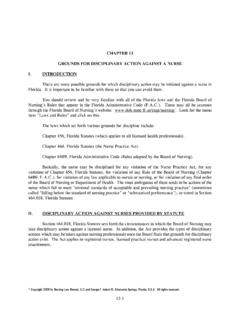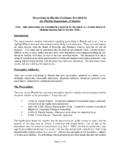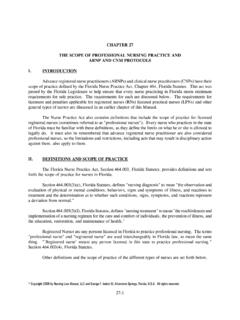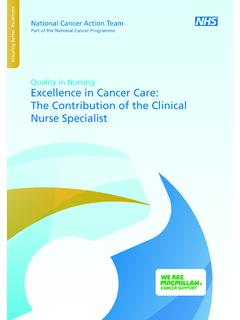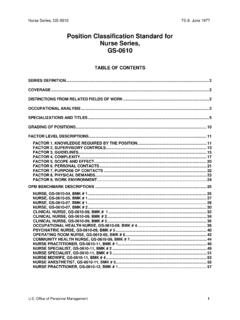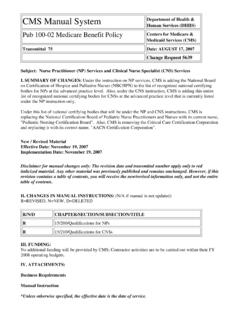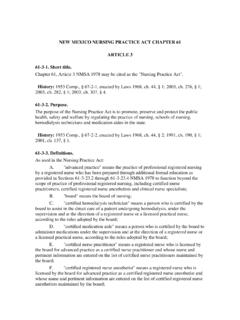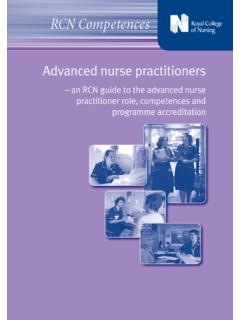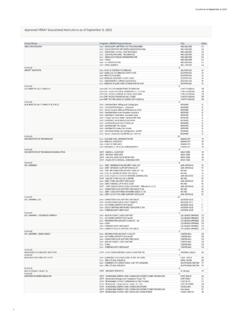Transcription of CHAPTER 6 THE FLORIDA NURSE PRACTICE ACT AND THE …
1 Copyright 2008 by Nursing Law Manual, LLC and George F. Indest III, Altamonte Springs, FLORIDA , All rights 6 THE FLORIDA NURSE PRACTICE ACT AND THE SCOPE OF FLORIDA NURSE PRACTICE Act, CHAPTER 464, FLORIDA Statutes, was enacted to ensure that everynurse practicing in FLORIDA meets minimum requirements for safe PRACTICE . A NURSE who falls below theminimum competency or who otherwise present a danger to the public shall be prohibited from practicingin FLORIDA . The statute speaks primarily to the most common classification of nurses: Registered Nurses(RNs) and Licensed Practical Nurses (LPNs). The requirements for licensure and penalties applicable formisconduct shall be set forth below. Other classifications of nurses (Advanced Registered Nurses, RN FirstAssistants, Retired NURSE Volunteers and Certified Nursing Assistants) are also provided for requirements of each will be discussed NURSE PRACTICE Act contains definitions that include the scope of PRACTICE for licensed registerednurses, practical nurses and NURSE practitioners.
2 Every NURSE who practices in the state of FLORIDA must befamiliar with these definitions, as they define the limits on what she is allowed to legally AND SCOPE OF PRACTICEThe FLORIDA NURSE PRACTICE Act, Section , FLORIDA Statutes, provides definitions and setsforth the scope of PRACTICE for nurses in (3)(e), FLORIDA Statutes, defines "nursing diagnosis" to mean "the observation andevaluation of physical or mental conditions, behaviors, signs and symptoms of illness, and reactions totreatment and the determination as to whether such conditions, signs, symptoms, and reactions representa deviation from normal."Section (3)(f), FLORIDA Statutes, defines "nursing treatment" to mean "the establishment andimplementation of a nursing regimen for the care and comfort of individuals, the prevention of illness, andthe education, restoration, and maintenance of health.
3 "It is important to remember that in many instances, where the physician is present and providingdirect supervision to the NURSE , she may merely act as "the physician's hands" and is not providing servicesstrictly under her nursing license. If, for example, the licensed physician could be supervising anonlicensed person in performing the same tasks ( , a medical student, a surgical technician, or amedical assistant), then it should not be considered to be either exceeding the scope of the NURSE 's licenseor the unlicensed PRACTICE of medicine, if the NURSE performs these. Again, this contemplates that thephysician is actually present, looking on and directly supervising and controlling whatever actions the nurseis taking under the physician's direct definitions and the scope of PRACTICE of the different types of nurses are set forth NURSING LAW MANUAL_____ Copyright 2008 by Nursing Law Manual, LLC and George F.
4 Indest III, Altamonte Springs, FLORIDA , All rights NURSESR egistered Nurses are any persons licensed in FLORIDA to PRACTICE professional nursing. The terms"professional NURSE " and "registered NURSE " are used interchangeably in FLORIDA law, to mean the samething. "'Registered NURSE ' means any person licensed in this state to PRACTICE professional nursing."Section (4), FLORIDA scope of PRACTICE for a registered NURSE is defined in Section (3)(a), FLORIDA Statutes,as follows:" PRACTICE of professional nursing" means the performance of those actsrequiring substantial specialized knowledge, judgment, and nursing skillbased upon applied principles of psychological, biological, physical, andsocial sciences which shall include, but not be limited to: 1.
5 The observation, assessment, nursing diagnosis, planning,intervention, and evaluation of care; health teaching and counseling of theill, injured, or infirm; and the promotion of wellness, maintenance ofhealth, and prevention of illness of others. 2. The administration of medications and treatments as prescribedor authorized by a duly licensed practitioner authorized by the laws of thisstate to prescribe such medications and treatments. 3. The supervision and teaching of other personnel in the theoryand performance of any of the above acts. PRACTICAL NURSESThe licensed practical NURSE is any person licensed in FLORIDA to PRACTICE practical nursing. Floridastatutes define practical nursing as the performance of selected acts, including the administration oftreatments and medications, in the care of the ill, injured, or infirm and the promotion of wellness,maintenance of health, and prevention of illness of others under the direction of a registered NURSE , alicensed physician, a licensed osteopathic physician, a licensed podiatric physician, or a licensed (b), FLORIDA REGISTERED NURSES PRACTITIONERS (ARNPS) AND CLINICALNURSE SPECIALISTSThe Advanced Registered NURSE Practitioner (ARNP)
6 Is a NURSE who, in addition to being licensedto PRACTICE professional nursing as defined above, has obtained postbasic specialized education, training,and experience and is certified by the Board of Nursing to perform advanced-level nursing acts. Withinthe context of advanced or specialized nursing PRACTICE , the Advanced Registered NURSE Practitioner mayFLORIDA NURSING LAW MANUAL_____ Copyright 2008 by Nursing Law Manual, LLC and George F. Indest III, Altamonte Springs, FLORIDA , All rights acts of nursing diagnosis and nursing treatment of alterations of the health status. The ARNP mayalso perform acts of medical diagnosis and treatment, prescription, and operation. The requirements forARNPs and a detailed discussion of their scope of PRACTICE are contained in another CHAPTER of this (6), FLORIDA Statutes, defines "clinical NURSE specialist" to mean "any personlicensed in this state to PRACTICE professional nursing and certified in clinical NURSE specialist PRACTICE .
7 " InFlorida, clinical NURSE specialists include certified registered NURSE anesthetists (CRNAs), certified nursemidwives (CNMs) and NURSE practitioners (NPs) or certified NURSE practitioners (CNPs). These are alldiscussed in a separate CHAPTER in this ASSISTANTSIn FLORIDA , medical assistants (MAs) are not licensed. In addition, there is no requirement that theybe certified, in order to work as a medical assistant. Usually, a medical assistant will have little or noformal training. Usually a medical assistant will have graduated from high school, but even this is notrequired. There are some schools, institutions, two year colleges, and other educational programs whichprovide training for medical assistants and offer "certification.
8 " Most medical assistants receive on-the-jobtraining from physicians and nurses in physicians' offices or in (1), FLORIDA Statutes, defines a medical assistant as used in this section, "medical assistant" means aprofessional multiskilled person dedicated to assisting in all aspects ofmedical PRACTICE under the direct supervision and responsibility of aphysician. This practitioner assists with patient care management,executes administrative and clinical procedures, and often performsmanagerial and supervisory functions. Competence in the field alsorequires that a medical assistant adhere to ethical and legal standards ofprofessional PRACTICE , recognize and respond to emergencies, anddemonstrate professional you can see from the exact language of the statute itself, there is no requirement that a medical assistantbe licensed or certified by anybody.
9 Some medical assistants do take formal course work and some dobecome certified by private organizations; however, there is no legal requirement to do (2), FLORIDA Statutes, defines the duties of a medical assistant as the direct supervision and responsibility of a licensedphysician, a medical assistant may undertake the following duties:(a)Performing clinical procedures, to aseptic vital patients for the physician's NURSING LAW MANUAL_____ Copyright 2008 by Nursing Law Manual, LLC and George F. Indest III, Altamonte Springs, FLORIDA , All rights venipunctures and and reporting patients' signs orsymptoms.(b)Administering basic first aid.(c)Assisting with patient examinations or treatments.(d)Operating office medical equipment.
10 (e)Collecting routine laboratory specimens as directed by thephysician.(f)Administering medication as directed by the physician.(g)Performing basic laboratory procedures.(h)Performing office procedures including all generaladministrative duties required by the physician.(i)Performing dialysis procedures, including home , it is perfectly permissible and legal for a medical assistant, even though he is unlicensed,to provide many services and perform many activities which a non-healthcare professional might mistakenlyconsider to be the " PRACTICE of medicine." Since the FLORIDA Legislature has specifically authorized theforegoing acts to be performed by medical assistants, even unlicensed, uncertified medical assistants, aperson performing such duties for a physician does not commit "unlicensed PRACTICE of medicine.
